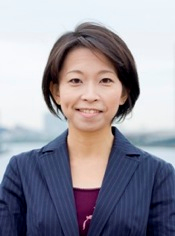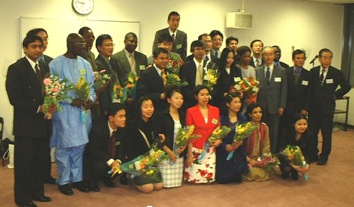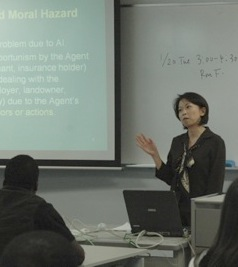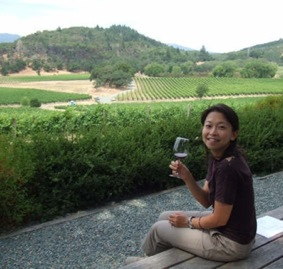 Aya Suzuki, Japan
Aya Suzuki, Japan
Assistant Professor, GRIPS
International Development Studies Program (’00/’02)
What is your area of specialization and how did you come to work in this area?
My areas of specialization are development economics and agricultural economics. How I came to work in this area is actually a bit of a long story.
When I was an undergraduate student, I started a small NGO-like group with my friends which aimed to work toward the efficient use of the Japanese ODA, particularly the small-scale grant scheme called the Grant Assistance for Grassroots Project (GGP). Apart from studying the details of ODA (such as the history, schemes, distribution over years, etc.), we also assisted some NGOs/NPOs in developing countries that applied for this fund, particularly in communicating and negotiating with the Japanese embassies that were in charge of the grant decisions. My first experience in development was when I assisted a hospital in Mumbai, India, to apply for funds to improve their facilities in a section that focused on preventing mother-child transmission of HIV/AIDS.
Through numerous correspondences and negotiations and liaising with concerned organizations, the hospital we assisted finally succeeded in obtaining the funds of JPY12,000,000. While I was extremely happy that my first project ended in a success, through the process, I learned a tremendous lot about the difficulties and complexities of dealing with development issues. While the project’s concern was medical, I encountered many socio-economic issues surrounding the HIV problem. Most notably, the widespread poverty and high unemployment due to the underdevelopment of the Indian economy, which makes people very vulnerable in difficult situations.
When we succeeded in receiving the fund, I had already graduated from the university and was working in a government-related non-profit organization which dealt with development assistance especially in the field of IT. With the experience of India, I grew more and more interested in understanding the problems of underdevelopment, particularly the structure of economic activities in society. I did have a passion to work in the field of development, but what I crucially lacked were the analytical skills to think about development issues objectively. I felt that these analytical skills would be essential if I want to make anything happen in future.
Thus, I applied for the IDS program in GRIPS, which turned out to be one of the most important milestones in my life. When I entered the IDS program, I actually had  never imagined myself going for further studies. But learning from excellent scholars like Prof. Hayami and Prof. Otsuka, who emphasize the importance of examining the reality based on their careful fieldwork, I was gradually drawn to rigorous academic research work. One year of coursework at GRIPS provided me a lot of hints, but it was simply not enough to satisfy my curiosity and concerns relating to development issues I had in mind.
never imagined myself going for further studies. But learning from excellent scholars like Prof. Hayami and Prof. Otsuka, who emphasize the importance of examining the reality based on their careful fieldwork, I was gradually drawn to rigorous academic research work. One year of coursework at GRIPS provided me a lot of hints, but it was simply not enough to satisfy my curiosity and concerns relating to development issues I had in mind.
My interest was not only in the economic growth of developing countries, but also in the relation between our lives here in the developed world and the lives of people in developing countries. I wanted to understand the background structure of economies that we are not very much aware of in our daily life. In a way, my interest in development went backward—my initial interest in development was on taking action and making changes, but as I learned more about it, my interest stepped backward to examining the structure of the problem closely before I take any actions. I am hoping this backward step will actually be a step forward in the long-run. It is like making a mountain in the sandbox—if you want to make a high mountain, you should first take time to build a large base rather than hurrying up to finish up a mountain.
Thus, I went to the University of California, Davis, in the U.S. to study development economics. I studied the pineapple industry in Ghana for my dissertation and completed my Ph.D. degree in June 2008. Now I am back at GRIPS, teaching microeconomics to the current IDS students and doing research on the agricultural and industrial development in Sub-Saharan Africa.
Have you always wanted to pursue a career in academia? What attracts you most about it?
As explained above, actually not. I have always been interested in working in the field of development and my focus was more on the practice rather than academic researches. However, due to the background that I explained above, I grew interested in the path of academia, hoping to be in a position to propose some meaningful policies to policymakers in the future.
What I consider the best in academia is the liberty of research. In academia, I think what you need to value the most is your discipline in trying to find the truth. You observe the reality, consider what is happening from various angles, and provide objective and convincing evidence to support your argument. That is very easy to say and very difficult to do (indeed!). But, reality is a very complex phenomenon, and without hard effort, you cannot see the truth at all. That part of academia I am very much attracted to.
To me, doing the fieldwork is especially stimulating. That is where you try to combine your field observation with the theories you have learned form textbooks and in class. I once thought it’s like a jam session between the reality and myself. In the field, some interesting observations suddenly jump into you, and you try your best to respond to what you have encountered. Then reiterating this process many times, you finally converge to some great findings (if successful, that is!).
Apart from that, interacting with students is also fun, particularly because they are my own kouhai. Because I was once in their shoes, I think I understand how they feel to be students here. At the graduate level, most of students are very motivated, and that makes the academic environment in GRIPS very inspiring. I really enjoy talking with students, both about the academic topics and about themselves.
You are the first GRIPS alumnus to be appointed as faculty here. How does it feel to be back at GRIPS in your new capacity as Assistant Professor?

Being an alumnus of GRIPS and one of the first batch IDS students, I have a special fond feeling toward this school and the program. Also because of the important impact that my student experience at GRIPS has given on my life afterwards, I feel much honored and personally happy to be in a position to contribute to make GRIPS even a better institute. Although, being a first-year assistant professor here, I am constantly worried about the quality of my lectures, and I would like to do my best in helping students to understand the subject.
You were a student in the first batch of the IDS program. How has GRIPS changed since the time when you were a student here?
In terms of the coursework in the IDS program, I think it has improved greatly since my batch. We have more faculty members and a broader variety of courses than before. We now have a class called Applied Development Research in which students work very closely with their advisors to write an academic paper. I wish we had that class back in my student days. Also, a number of students who graduated from the IDS program have continued in the Ph.D. program and so far eight of them have obtained a doctoral degree from GRIPS. Although I realize that there is always room for more improvements, I think the IDS program has done well so far.
As for GRIPS, the most dramatic and noticeable change was the move to this brand-new beautiful campus. Also, the number of master’s programs offered, both in Japanese and English have increased. In terms of research, GRIPS has received large-scale competitive research funds from the Ministry of Education, Culture, Sports, Science and Technology (21COE and GCOE). Under these research projects, we have produced a lot of academic contributions. I am excited that these academic contributions have also started to attract attention from practitioners such as donors, international organizations, and governments in developing countries, and there are now more projects jointly supported by these organizations. Within campus, I think these days there are more efforts being made to encourage interaction among students, faculty, and staffs through various seminars/workshops, social and cultural events than before. Overall, I think GRIPS has achieved a lot over the years.
What was the most important thing you learned while being here as a student?
I would say that it is the importance to think on your own. Before GRIPS, I think I used to look for answers that I learned somewhere before, which may have been written in textbooks or have been taught by professors. But the coursework in GRIPS required us to develop abilities to think on our own, based on the accumulated knowledge we acquired in class. Exams were to test not what we know, but how we can apply the knowledge we learned. But of course it takes time to go through this kind of paradigm shift, so I would say that GRIPS prepared me to stand at the starting point toward that direction
How did your experience at GRIPS prepare you for future endeavours?
When I was a student at GRIPS, I devoted myself to studying like I had never done before. I think that experience gave me the confidence that if you are dedicated and really make an effort, you can achieve things that may have seemed impossible. In the US where I studied later, the effort required was (unfortunately) actually much greater than I thought possible till then, but somehow I could survive without dropping out halfway. I think my years at GRIPS and the confidence I gained helped me to continue.
Having studied at both Japanese and US universities, how do you compare these experiences? Can you say something about the differences in (academic) culture, teaching methods, values, attitudes etc.?
Many things are different, but overall in the US system, academic environment is more individualistic, more casual, and freer than the Japanese system. Discussion is always encouraged in class in the US. Because people from all over the world try to study in the US system, competition among students is very severe. There were extremely smart people, both faculty and students. I had never met such clever people before and their presence sometimes made classes like a battlefield between professor and students.
The relation between faculty and students is also different in the US. Partly because I went to the West coast in US, the relationship was more casual. Students call professors by their first names, some professors come to lectures in T-shirts and shorts, and we often had social events with faculty members, such as BBQ or sport games where students compete with faculty. Your advisors treat you as their colleagues rather than students, especially after you pass your qualifying exam. They listen to you seriously when you go talk to them. On the other hand, in Japan, your sensei is and will always be your sensei. But each system has its own advantage. In the Japanese system, the relation is tighter; your advisors really look after you. Although there is some kind of a hierarchic relation between a professor and students, in a way they treat you like their kids. In the US, it’s much more independent, so you need to look after yourself. If you have a problem, you need to solve it. Even if you wait, nobody does it for you. Although advisors treat you as their colleagues, that does not mean that they are easy graders. If you do not make enough progress, it is your own problem. There are both good and severe sides to each system, which I think are deeply rooted in each culture.
If you could choose another profession to be in, what would it be?
A producer of documentary films, maybe? Actually it seems similar to academic work in a sense that you study a problem, go out to the field and talk to many people, and compile what you have learned. I guess I am just a curious person.
What is your favourite thing to do when you are not working?
Hanging out with my close friends, making sweets, and eating good food.
How do you maintain a balance between your work and the rest of your life?
I am not sure whether I am able to maintain this balance when I am very busy…but when I am over-stressed, talking to my husband and my friends always works. Without them, I really do not know what I would do.
What advice would you give to current GRIPS students?
I am sure that everyone is busy with the coursework, exams, or writing thesis. But I would advise them to take some time out once in a while and organize some events with their classmates. I graduated seven years ago, but I still keep in touch with many of the 1st batch IDS students. Although most of us are spread all over the world, our network has been very h4, I think because we shared both difficult times and good times together when we were at GRIPS. GRIPS is really a unique environment where you meet with people from very different backgrounds, and I hope that students make the most out of this rare opportunity while they are here.





